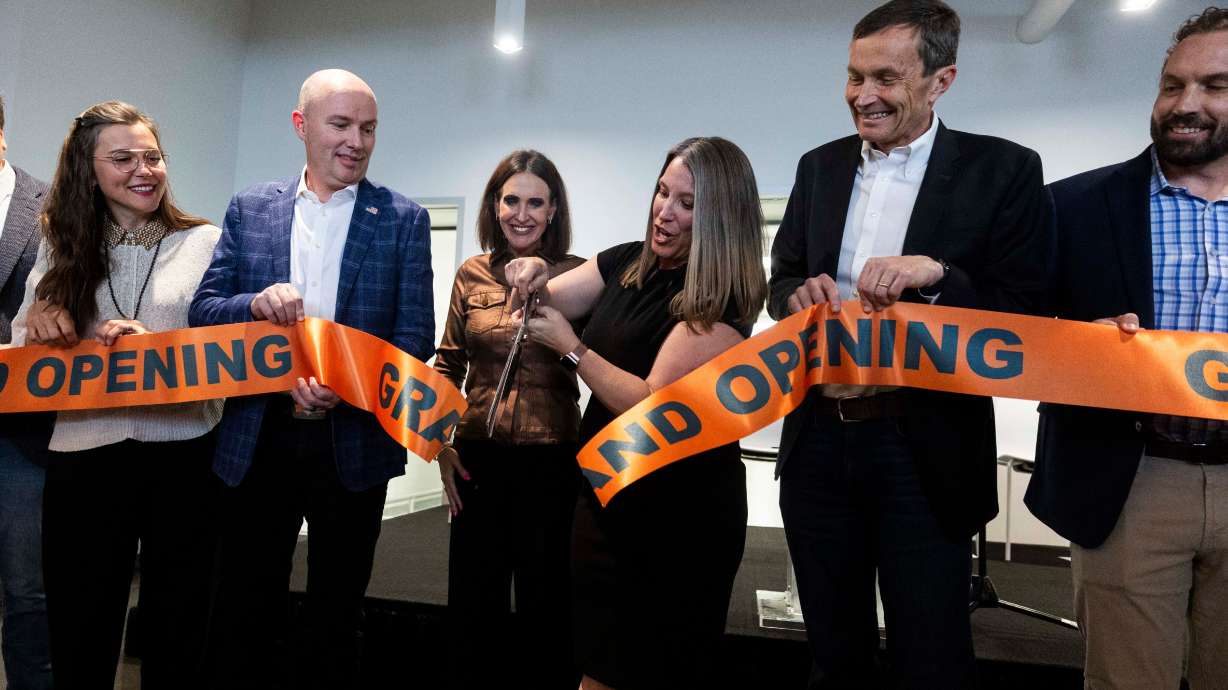Estimated read time: 4-5 minutes
- Denali Therapeutics opens a new facility in Salt Lake City, advancing neurodegenerative treatments.
- Gov. Spencer Cox welcomed the biotech firm, highlighting Utah's role in life science advancements and business.
SALT LAKE CITY — Denali Therapeutics is advancing the fight against neurodegenerative diseases thanks to pioneering work in methods to carry medicines across the blood-brain barrier, a critical step in addressing the root issues of a host of debilitating conditions.
The San Francisco-based company, founded in 2015, held a grand opening ceremony last week for its brand new, 60,000 square-foot manufacturing facility on the west side of Salt Lake City, the first biotech operation of its kind in Utah.
At the event, Utah Gov. Spencer Cox welcomed the company to Salt Lake City, noting Utah is "punching far above our weight" when it comes to life science advancements and business development, and characterized the high level of success as a continuation of the state's pioneer spirit.
Cox also shared his own connection to Denali's battle against degenerative disorders.
"This is deeply personal for all of us," Cox said. "I'm pretty sure that every one of us in this room has someone they care deeply about. For me, it's my dad who was diagnosed with Parkinson's six years ago.
"I know that we are on the cusp of so many miracles, because we have dreamers, because we have builders, because we have people who are willing to do the hard stuff even when they're told it can't happen or shouldn't happen."
Crossing the blood-brain barrier
Denali co-founder and President/CEO Ryan Watts did his undergraduate studies at the University of Utah before earning a doctorate at Stanford University. He has spent years studying neuroscience and neurodevelopment and described his company's innovative technology as a game changer in treating diseases like Hunter syndrome, Alzheimer's and Parkinson's.
"We invented a technology that allows biologic medicines to cross the blood-brain barrier, a major hurdle in treating neurological diseases," Watts said in a Deseret News interview. "Our goal is to deliver life-changing medicines to patients with rare genetic disorders and neurodegenerative conditions."
Watts said Denali has multiple development pursuits in play but began with an initial focus on Hunter syndrome, a rare childhood genetic disorder that primarily affects boys and leads to neurological degeneration.

Traditionally, enzyme replacement therapies can treat the body's organs but cannot cross the blood-brain barrier to impact the brain. Denali's breakthrough technology, Watts said, now makes it possible to deliver the necessary enzymes to the brain, significantly altering the course of the disease.
"We started clinical trials in 2020, and we now have solid data showing that our drug works," Watts said. "Biomarkers indicate that we can actually cross the blood-brain barrier and treat the brain directly, which opens the door for expanding our treatments to other neurological disorders like Alzheimer's and frontotemporal dementia."

Why on-shoring matters
Denali's new facility in Salt Lake City, which began operations last December, is set to play a crucial role in the company's mission to produce new medicines. Watts emphasized the strategic importance of on-shoring Denali's manufacturing capabilities.
"It's much more efficient to manufacture these medicines ourselves, and having production in the U.S. reduces supply chain risks," Watts said. "Utah is emerging as a biotech hub, and we're proud to be part of that. We've already hired around 40 scientists, and we're continuing to grow."
In addition to Hunter syndrome, Denali is advancing biologic medicines for other neurological diseases, including Alzheimer's, a field that holds personal significance for Watts.

"My mother developed dementia a year before I founded Denali, and watching her struggle deeply motivated me to pursue this path," he said. "It's one of the reasons I'm so passionate about what we're doing here — it's not just business for me, it's personal."
Denali is aiming to file for regulatory approval for its first product in the coming months and has plans in place to expand globally.
"We're on a mission to deliver our medicines worldwide," Watts said. "We believe these treatments can change lives, whether it's giving a child with Hunter syndrome a chance at normal development or improving the lives of those with Alzheimer's and Parkinson's."

With clinical trials in multiple countries and a rapidly growing team, Denali is positioning itself as a leader in the biotech field, Watts said. As the company's vision of crossing the blood-brain barrier becomes a reality, the potential to treat a range of neurodegenerative diseases is rapidly advancing.
"We are incredibly excited about what the future holds," Watts said. "It's a privilege to be working on something that has the potential to make such a profound impact, not only for patients but also for the biotech community here in Utah and beyond."










